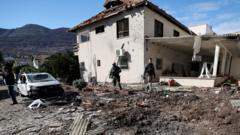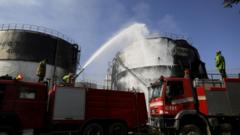The ceasefire deal presented by Israeli Prime Minister Benjamin Netanyahu has faced significant backlash from displaced residents in northern Israel. Many fear returning to their homes amidst the ongoing threats posed by Hezbollah and express concerns about the implications of this agreement. While Netanyahu highlighted past military successes, critics, including some political allies, claim he is capitulating to pressure. Polls reveal a divided public opinion, with many residents questioning the security conditions that would allow them to return home without fear.
Ceasefire Agreement Sparks Anger and Distrust Among Displaced Israelis

Ceasefire Agreement Sparks Anger and Distrust Among Displaced Israelis
The ceasefire deal has intensified fears and frustrations among those displaced by ongoing conflict in northern Israel.
Despite Netanyahu's claim of “unprecedented achievements” for Israel in the multi-front war, increased anxiety and anger characterize the sentiments of those in the north. While he stated that the ceasefire would allow the focus to shift toward countering Iran's presence and reiterated Israel's commitment to military operations, the emotional toll on displaced citizens remains high. The recent attacks from Lebanon have exacerbated feelings of insecurity, with many residents expressing skepticism regarding the Lebanese army's ability to restore peace. As political leaders debate the merits of a ceasefire, the underlying despair among the Israeli populace highlights a complex situation filled with fear and conflicting opinions, making the path to safety and resolution all the more challenging.


















